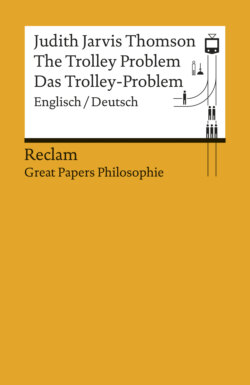Читать книгу The Trolley Problem / Das Trolley-Problem (Englisch/Deutsch) - Judith Jarvis Thomson - Страница 12
На сайте Литреса книга снята с продажи.
VIII.
ОглавлениеIt is arguable, however, that what is relevant is not that toppling the fat man off the footbridge is itself an infringement of a right of the fat man’s but rather that toppling him off the footbridge is itself an infringement of a particularly stringent right of his.
What I have in mind comes out in yet another variant on Bystander at the Switch. Here the bystander must cross (without permission) a patch of land that belongs to the one in order to get to the switch; thus in order to get the trolley to threaten the one instead of five, the bystander must infringe a right of the one’s. May he proceed?
Or again, in order to get the switch thrown, the bystander must use a sharply pointed tool, and the only available sharply pointed tool is a nailfile that belongs to the [72]one; here too the bystander must infringe a right of the one’s in order to get the trolley to threaten the one instead of five. May he proceed?
For my own part, I do not find it obvious that he may. (Remember what the bystander will be doing to the one by throwing that switch.) But others tell me they think it clear the bystander may proceed in such a case. If they are right – and I guess we should agree that they are – then that must surely be because the rights which the bystander would have to infringe here are minor, trivial, non-stringent – property rights of no great importance. By contrast, the right to not be toppled off a footbridge onto a trolley track is on any view a stringent right. We shall therefore have to recognize that what is at work in these cases is a matter of degree: If the agent must infringe a stringent right of the one’s in order to get something that threatens five to threaten the one (as in Fat Man), then he may not proceed, whereas if the agent need infringe no right of the one’s (as in Bystander at the Switch), or only a more or less trivial right of the one’s (as in these variants on Bystander at the Switch), in order to get something that threatens five to threaten the one, then he may proceed.
Where what is at work is a matter of degree, it should be no surprise that there are borderline cases, on which people disagree. I confess to having been greatly surprised, [74]however, at the fact of disagreement on the following variant on Bystander at the Switch:
The five on the straight track are regular track workmen. The right-hand track is a dead end, unused in ten years. The Mayor, representing the City, has set out picnic tables on it, and invited the convalescents at the nearby City Hospital to have their meals there, guaranteeing them that no trolleys will ever, for any reason, be turned onto that track. The one on the right-hand track is a convalescent having his lunch there; it would never have occurred to him [1412] to do so if the Mayor had not issued his invitation and guarantee. The Mayor was out for a walk; he now stands by the switch.14
For the Mayor to get the trolley to threaten the one instead of the five, he must turn the trolley onto the right-hand [76]track; but the one has a right against the Mayor that he not turn the trolley onto the right-hand track – a right generated by an official promise, which was then relied on by the one. (Contrast the original Bystander at the Switch, in which the one had no such right.) My own feeling is that it is plain the Mayor may not proceed. To my great surprise, I find that some people think he may. I conclude they think the right less stringent than I do.
In any case, that distributive exemption that I spoke of earlier is very conservative. It permits intervention into the world to get an object that already threatens death to those many to instead threaten death to these few, but only by acts that are not themselves gross impingements on the few. That is, the intervenor must not use means that infringe stringent rights of the few in order to get his distributive intention carried out.
It could of course be argued that the fact that the bystander of the original Bystander at the Switch makes threaten the one what already threatens the five, and does so by means that do not themselves constitute infringements of any right of the one’s (not even a trivial right of the one’s), shows that the bystander in that case infringes no right of the one’s at all. That is, it could be argued that we have here that independent ground for saying that the bystander does not infringe the one’s right to life which I said would be [78]needed by a friend of (ii).15 But I see nothing to be gained by taking this line, for I see nothing to be gained by supposing it never permissible to infringe a right; and something is lost by taking this line, namely the possibility of viewing the bystander as doing the one a wrong if he proceeds – albeit a wrong it is permissible to do him.
